论欲望对_嘉莉妹妹_中人物命运的影响_李世奎
欲望操控下的悲剧人生

欲望操控下的悲剧人生作者:陈晶来源:《山东青年》2015年第04期●摘要:《嘉莉妹妹》是美国现实主义作家德莱塞的重要作品之一,描写了农村姑娘嘉莉来到大城市芝加哥寻找幸福,为摆脱贫困,出卖自己的贞操,先后与推销员和酒店经理同居,后又凭美貌与机遇成为百老汇歌星的故事。
本文以《嘉莉妹妹》为例,浅谈欲望驱使下的悲剧人生。
关键词:德莱塞;《嘉莉妹妹》;欲望;悲剧人生一、引言《嘉莉妹妹》这本书主要描写了一个单纯的名叫嘉莉·米贝的农村姑娘在生存欲望驱使下来到大城市芝加哥的故事。
工作的艰辛、疾病的困扰和失业的痛苦等生存的艰难使她最终选择成为推销员杜洛埃的情妇,后来为了更好的发展又与酒店经理赫斯特伍德私奔。
当赫斯特伍德在纽约丢掉工作之后,她出去自谋生路,由于偶然的机会一举成名,拥有了名和利以及一切象征上流社会的东西,表面上似乎实现了朝思暮想的愿望,然而在故事的结尾她依然坐在摇椅里幻想着真正的幸福,究其根本,是她的无休无止的欲望使她在错误的轨道上越走越远,不满足于现状,永远在追寻下一个目标。
二、金钱与诱惑驱使下的空洞人生《嘉莉妹妹》的时代背景是世纪末的美国自由资本主义蓬勃发展并进入兴盛时期,美国从一个以农业为主的社会变成了一个以城市为中心的社会。
机械化的生产提高了效率。
农村多余的劳动力也进入了城市;科技经济的迅速发展为人们自由选择自己想要的生活方式提供了更多的机会。
都市理所当然的成为了年轻人追求的梦。
美国资本主义的飞速发展与繁荣,助长了人们对消费的追从和对金钱的盲目崇拜。
随着消费意识形态成为整个国家的主要意识形态,勤俭、节约、自控等传统道德标准逐渐弱化。
2.1新鲜事物的强力吸引看到商店里的琳琅满目的新衣服、大街上奔驰而过的漂亮马车时,金钱无比重要的这种想法在嘉莉妹妹的脑中油然而生,这也是穿着入时的推销员杜洛埃之所以吸引她的原因,到达芝加哥之后,大城市的诱惑使她觉得自己的打扮是如此的卑微。
各种各样的巨幅广告和美丽诱人的物品令她羡慕不已,精致的拖鞋和长统袜子,优美的皱边衬衫和衬裙,花边、缎带、发梳、荷包每一件东西都对她有着无限的魔力。
对《嘉莉妹妹》女主角成长的分析
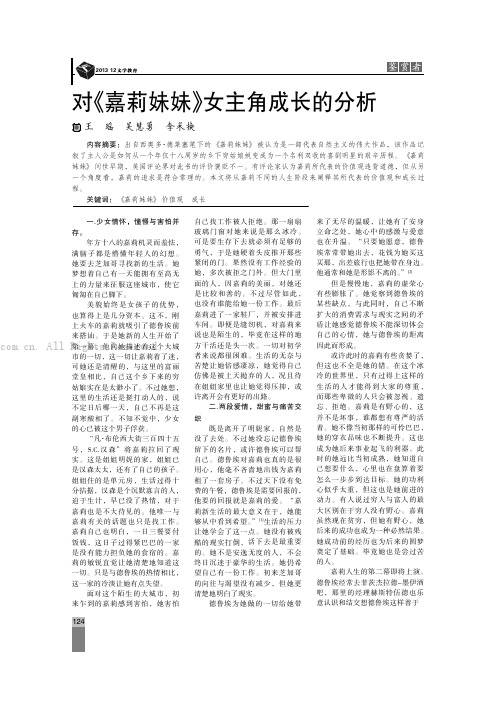
2013.12一.少女情怀,憧憬与害怕并存。
年方十八的嘉莉机灵而羞怯,满脑子都是懵懂年轻人的幻想。
她要去芝加哥寻找新的生活。
她梦想着自己有一天能拥有至高无上的力量来征服这座城市,使它匍匐在自己脚下。
美貌始终是女孩子的优势,也算得上是几分资本。
这不,刚上火车的嘉莉就吸引了德鲁埃前来搭讪。
于是她新的人生开始了第一幕。
他向她描述着这个大城市的一切,这一切让嘉莉着了迷,可她还是清醒的,与这里的富丽堂皇相比,自己这个乡下来的穷姑娘实在是太渺小了。
不过她想,这里的生活还是挺打动人的,说不定日后哪一天,自己不再是这副寒酸相了。
不知不觉中,少女的心已被这个男子俘获。
“凡·布伦西大街三百四十五号,S.C.汉森”将嘉莉拉回了现实。
这是姐姐明妮的家,姐姐已是汉森太太,还有了自己的孩子。
姐姐住的是单元房,生活过得十分拮据,汉森是个沉默寡言的人,迫于生计,早已没了热情,对于嘉莉也是不大待见的。
他唯一与嘉莉有关的话题也只是找工作。
嘉莉自己也明白,一日三餐要付饭钱,这日子过得紧巴巴的一家是没有能力担负她的食宿的。
嘉莉的敏锐直觉让她清楚地知道这一切。
只是与德鲁埃的热情相比,这一家的冷淡让她有点失望。
面对这个陌生的大城市,初来乍到的嘉莉感到害怕,她害怕自己找工作被人拒绝。
那一扇扇玻璃门窗对她来说是那么冰冷。
可是要生存下去就必须有足够的勇气,于是她硬着头皮推开那些紧闭的门。
果然没有工作经验的她,多次被拒之门外。
但大门里面的人,因嘉莉的美丽,对她还是比较和善的。
不过尽管如此,也没有谁能给她一份工作。
最后嘉莉进了一家鞋厂,并被安排进车间。
即便是缝纫机,对嘉莉来说也是陌生的,毕竟在这样的地方干活还是头一次。
一切对初学者来说都很困难。
生活的无奈与苦楚让她倍感凄凉,她觉得自己仿佛是被上天抛弃的人,况且待在姐姐家里也让她觉得压抑,或许离开会有更好的出路。
二.两段爱情,甜蜜与痛苦交织既是离开了明妮家,自然是没了去处。
不过她没忘记德鲁埃留下的名片,或许德鲁埃可以帮自己。
欲望驱使与实用主义视角下的嘉莉妹妹

作品研究2009.11.B参考文献:[1][美]尤金・奥尼尔.漫长的旅程[M].欧阳基等译.长沙:湖南人民出版社,1983年.[2]布伦退尔.《戏剧规律》.《戏剧与电影的剧作理论与技巧》.北京:中国电影出版社,1978年.[3]霍华德・劳逊.戏剧与电影的剧作理论与技巧[M].北京:中国电影出版社,1978年.[4]顾仲彝.编剧理论与技巧[M].北京:中国戏剧出版社,1981年.尼尔不是选择神、国王这些高贵的人物,而是把目光投放到普通人,剧中悲剧冲突重在内心、“最理想的悲剧冲突”、注重情境与冲突结合,展现了他高超的戏剧艺术。
《漫长的旅程》不像亚里士多德说的用“突转”与“发现”来造成强烈的戏剧效果,没有像《雷雨》那种“发现”真相大白后剧情“突转”,掀起暴风雨般的戏剧高潮。
相反,奥尼尔将催生冲突的酵母投放到这部作品中,让催生酵母在特定的戏剧情境中慢慢发酵,重在表现人物内心的戏剧冲突,体现出静穆的悲剧美学,与他所表现的失去宗教信仰而迷茫的严肃主题是完美一致的。
陈桂成(1964—),男,研究生学历,籍贯:广西陆川县,广西玉林师范学院中文系讲师,研究方向:中国古代文学的教学与科研。
朱江勇(1976—),男,江西瑞金人,厦门大学中文系2007级博士研究生,桂林旅游高等专科学校讲师,研究方向:戏剧理论与戏曲文化。
作者简介:[5]谭霈生.论戏剧性[M].北京:北京大学出版社,1981年.[6][德]黑格尔.《美学》第3卷(下册)[M].朱光潜译.北京:商务印书馆,1981年.[7]谭霈生.戏剧艺术特征性[M].上海:上海文艺出版社,1985年.1.嘉莉妹妹所处的社会环境和人生经历19世纪美国以生产为主的意识形态正逐渐被消费意识形态代替,这种消费享乐主义崇尚享乐和满足的生活方式。
这时的物品已经成为地位的象征,而不是仅仅满足基本的需要。
小说《嘉莉妹妹》的诞生正处在美国消费主义开始盛行的时代。
大都市已成为商品消费、媒体消费、休闲消费的中心,城市里拥有丰富多彩的消费场所,提供了一系列的消费形象和象征。
对嘉莉妹妹欲望的心理解析

对嘉莉妹妹欲望的心理解析◎魏京京(郑州大学外语学院河南・郑州450001)摘要小说《嘉莉妹妹》描述了一位女孩从农村到城市谋生直至后来成为纽约百老汇著名演员的故事。
文章运用弗洛伊德人格结构理论和马斯洛需求层次理论,对女主人公嘉莉妹妹的心理进行解析,从纵横两方面阐释其欲望背后的驱动力。
关键词欲望本我自我超我需求一、引言西奥多・德莱塞(Theodore Dreiser,1871-1945)是20世纪美国文坛上一位杰出的作家,也是美国现代小说创作的先驱。
他的第一部长篇小说《嘉莉妹妹》主要以欲望为主线,描述了女主人公嘉莉妹妹从一位农村姑娘变成纽约百老汇著名演员的整个过程,并对其生命沉浮中的种种心理变化进行了细致刻画。
小说不仅揭露了美国社会的贫富悬殊和道德沦丧,而且反映的道德观念也一反传统,因为嘉莉妹妹最终非但没有为其堕落行为受到惩罚,反而却红极一时。
因此,在1900年11月一经问世便激起轩然大波,曾一度被列为禁书,也从而引发了文学界长达三十余年的激烈争议,直至最终获得公众认可被推崇为经典之作。
但是,小说诞生一百多年后的今天,人们对嘉莉妹妹的性格特点及行为方式,尤其是她的无止欲望,仍然颇有争议褒贬不一。
诚然,欲望是支配嘉莉不择手段向上流社会攀登的巨大动力源泉。
但是,为什么她的欲望永远得不到满足,是什么因素支配着她不惜代价实现欲望?在揭示这些问题的原因时,由于受小说大量自然主义描写的影响,评论者多从她所处的社会环境和自然环境来分析,认为是外部因素主宰着她,使她在当时的社会与自然背景下,要想获得自我愿望的满足,只能接受命运的安排。
然而,辩证法认为,内因是事物发展变化的根据,外因是事物发展的条件,只有通过内因起作用。
因此,本文试从嘉莉妹妹自身特点和心理因素着手,运用著名心理学家弗洛伊德的人格结构理论和马斯洛的需求层次理论,从心理学角度对她的行为方式进行解析,探寻其不惜堕落而满足欲望的内在原因,以期对她的欲望有更深刻全面的了解。
论文《嘉莉妹妹》中文版

迷失在欲望中———《嘉莉妹妹》中的欲望解析摘要: 《嘉莉妹妹》是德莱塞的杰出代表作之一, 作品深刻地反映了当时的美国现实。
嘉莉对物的欲望, 赫斯特伍德对权力的欲望, 杜洛埃对性的欲望, 三位主公全都迷失在欲望中。
关键词: 德莱赛; 嘉莉; 欲望; 迷失西奥多·德莱塞( Theodore Herman AlberDreiser, 187118127—1945112128) 是20 世纪美国著名的现实主义作家。
他的小说形象生动地刻画了19世纪末, 20世纪初资本主义迅速发展中的美国现实社会。
在美国文学史上他第一次广泛真实地描写了美国多阶层的社会生活, 为美国现实主义文学开辟了新领域。
《嘉莉妹妹》是德莱塞第一部长名作, 揭露了当时的社会现实, 展现了在物欲横流的资本主义社会里, 人们迷失在自己的欲望中,展现了美国生活中没有上帝的一面”。
故事讲述的是嘉罗琳·米蓓(嘉莉妹妹) , 一个俊俏的农村姑娘, 她羡慕大都市的物质生活来到了芝加哥谋生。
严酷的现实破碎了她的美梦, 迎接她的是失业和疾病。
在走投无路时, 她做了推销员杜洛埃的情妇, 后来由于更大的欲望又做了酒店经理赫斯特伍德的情妇。
与赫斯特伍德私奔后, 在纽约由于偶然的机会她成了走红一时的演员, 挤上了上流社会,实现了她的梦想。
并抛弃了逐渐贫困的赫斯特伍德, 以不自觉的残忍将他推上了绝望之路。
然而,所谓的“上流社会生活”又给她带来了什么呢?她感到空虚, 找不到真正生活的意义, 在寂寞和凄凉中, 她坐在摇椅里梦想着那终不可得的幸福。
一、嘉莉的欲望———对物的欲望在小说中, 嘉莉的欲望是作者着重刻画的。
嘉莉本身就是一个充满欲望的人, 充满对物和金钱的欲望, 这一部分源于她的本性, “小时候, 她梦过童话里的宫殿和各种豪华气派的地方”。
嘉莉从哥伦比亚城来到芝加哥那一刻起就开始了对金钱的追求, 嘉莉在火车上看到杜洛埃的时髦打扮便意识到自己穿着寒酸, “突然间觉得自己像是穿了一身破烂儿。
物欲横流金钱至上浅析嘉莉妹妹
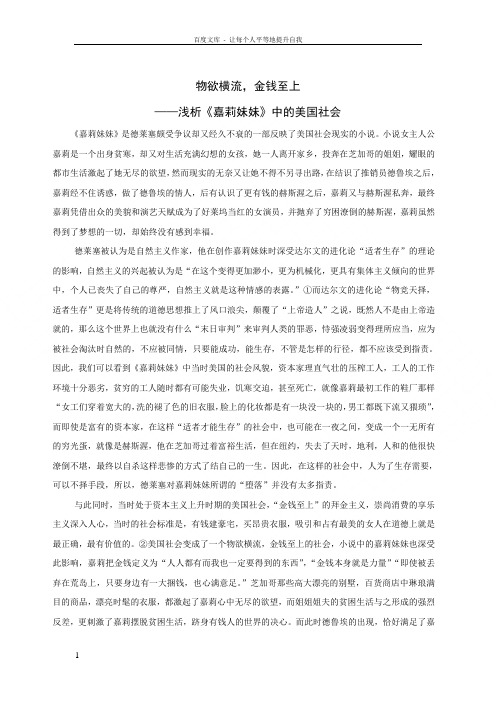
物欲横流,金钱至上——浅析《嘉莉妹妹》中的美国社会《嘉莉妹妹》是德莱塞颇受争议却又经久不衰的一部反映了美国社会现实的小说。
小说女主人公嘉莉是一个出身贫寒,却又对生活充满幻想的女孩,她一人离开家乡,投奔在芝加哥的姐姐,耀眼的都市生活激起了她无尽的欲望,然而现实的无奈又让她不得不另寻出路,在结识了推销员德鲁埃之后,嘉莉经不住诱惑,做了德鲁埃的情人,后有认识了更有钱的赫斯渥之后,嘉莉又与赫斯渥私奔,最终嘉莉凭借出众的美貌和演艺天赋成为了好莱坞当红的女演员,并抛弃了穷困潦倒的赫斯渥,嘉莉虽然得到了梦想的一切,却始终没有感到幸福。
德莱塞被认为是自然主义作家,他在创作嘉莉妹妹时深受达尔文的进化论“适者生存”的理论的影响,自然主义的兴起被认为是“在这个变得更加渺小,更为机械化,更具有集体主义倾向的世界中,个人已丧失了自己的尊严,自然主义就是这种情感的表露。
”①而达尔文的进化论“物竞天择,适者生存”更是将传统的道德思想推上了风口浪尖,颠覆了“上帝造人”之说,既然人不是由上帝造就的,那么这个世界上也就没有什么“末日审判”来审判人类的罪恶,恃强凌弱变得理所应当,应为被社会淘汰时自然的,不应被同情,只要能成功,能生存,不管是怎样的行径,都不应该受到指责。
因此,我们可以看到《嘉莉妹妹》中当时美国的社会风貌,资本家理直气壮的压榨工人,工人的工作环境十分恶劣,贫穷的工人随时都有可能失业,饥寒交迫,甚至死亡,就像嘉莉最初工作的鞋厂那样“女工们穿着宽大的,洗的褪了色的旧衣服,脸上的化妆都是有一块没一块的,男工都既下流又猥琐”,而即使是富有的资本家,在这样“适者才能生存”的社会中,也可能在一夜之间,变成一个一无所有的穷光蛋,就像是赫斯渥,他在芝加哥过着富裕生活,但在纽约,失去了天时,地利,人和的他很快潦倒不堪,最终以自杀这样悲惨的方式了结自己的一生。
因此,在这样的社会中,人为了生存需要,可以不择手段,所以,德莱塞对嘉莉妹妹所谓的“堕落”并没有太多指责。
解读《嘉莉妹妹》中主人公的人生
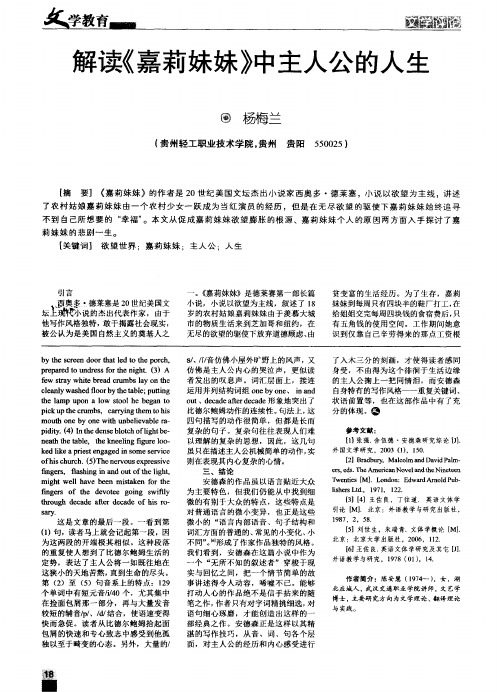
0 f is h c h u r c h . ( 5 ) T h e n e vo r u s e x p r e s s i v e
i f n g e r s .f l  ̄h ngi i n a n d o u t o f het t i ht g .
mi g h t we l l h a ve ee b n mi s t a k e n f o r he t f ng i e r s o f t h e d e v o t e e go ng i s wi tl f y t h r o ug h d e c a d e a f t e r d e c a d e o f h i s r o —
s a r y .
这是 文章的最后一 段。一看到 第 ( 1 )句 ,读 者马上 就会记 起第一段 ,因 为这 两段的开端极 其相似 。这种段 落 的重 复使人想到 了比德尔鲍姆生活 的 定势 ,表 达 了主人 公将 一如既往地在 这狭小 的天地苦熬 , 直到生 命的尽 头。 第 ( 2 )至 ( 5 )句音系上的特点 :1 2 9 个单词 中有 短元音/ i / 4 0个 ,尤其集 中 在捡 面包屑那一 部分,再与大量发 音 较短 的辅音, p / 、 d / 结合,使 语速变 得 快而 急促。读者从 比德尔鲍姆拾起面 包屑 的快速和专 心致志中感受 到他 孤 独 以至于 畸变 的心态。另外,大量 的/
引 言
欲望驱动下的嘉莉妹妹论文

欲望驱动下的嘉莉妹妹摘要:《嘉莉妹妹》是美国著名的自然主义小说家西奥多·德莱塞的第一部长篇小说,讲述的农村少女嘉莉如何从社会的底层一跃而成为百老汇明星的经历,生动地展示了嘉莉的欲望不断增大永无止境的图画。
文章从消费文化的角度分析了嘉莉欲望不断增大的外在原因和自身根源。
关键词:欲望消费文化环境《嘉莉妹妹》是美国著名的自然主义小说家西奥多·德莱塞(1871—1945)的第一部长篇小说。
书中描写了名叫嘉莉·米贝的农村姑娘因羡慕大城市的物质生活来到芝加哥谋生的故事。
她先后经历了寻找工作的艰辛、疾病的困扰和失业的痛苦。
为了生存,她成了推销员杜洛埃的情妇,后来又与酒店经理赫斯特伍德私奔。
在纽约赫斯特伍德也丢掉了工作,为生活所迫,她在一家剧院当上了一名合唱演员。
一个偶然的机会一举成名,挤进了上流社会,似乎实现了朝思暮想的愿望,然而在故事的结尾她依然坐在摇椅里梦想着自己的幸福。
究其原因,是因为嘉莉自始至终都被欲望驱使着,欲望使她永远不满足于现状,不断地寻找下一个目标。
她的欲望是多种因素促成的。
1.消费观念的影响在19世纪末20世纪初,美国社会发生了一场深刻的变革,以生产为主的意识形态正逐渐被消费意识形态代替,因为当时美国内战后政治上稳定,经济上迅速发展,工业化和城市化都达到了前所未有的水平,商品非常丰富。
经济要想进一步发展就必须最大限度地消费。
为此以鼓励人们互相攀比、摆阔气的消费文化兴盛起来。
这种文化的道德标准是:有钱建豪宅、买昂贵服装,男人以吸引和占有最美的女人为自豪。
像鲍德里拉所说的这时的物品就已经成为地位的象征,而不是仅仅满足生活的基本需要。
因此,人们应该听从本能的驱使,“作为消费者的人将享乐看成是自己的义务,享乐和满足就像一种事业”①。
在这种社会环境下,嘉莉渴望占有物品,特别是那些新衣服、漂亮马车之类。
期望用这些物品提升自己的价值和社会地位。
因此当她见到商店里琳琅满目的商品时,情不自禁地感到拥有这些无比重要。
对嘉莉妹妹欲望的分析
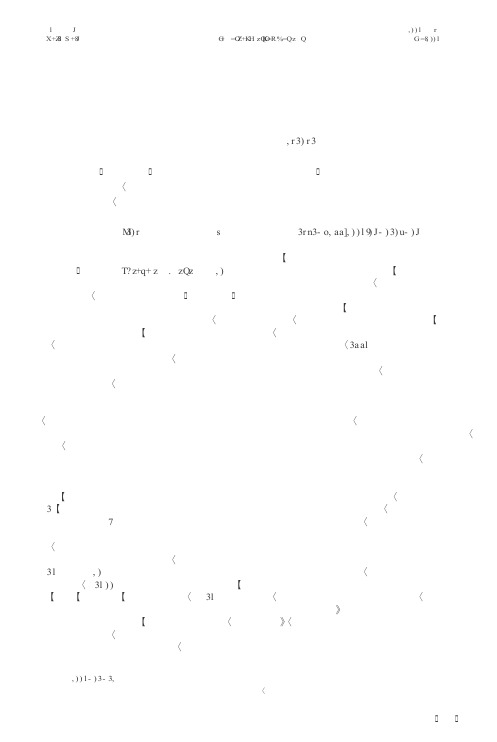
对嘉莉妹妹欲望的分析
任燕燕
(潍坊学院, 山东 摘 潍坊 2 6 10 6 1 )
要: �嘉莉妹妹� 是美国著名的自然主义小说家西奥多 � 德莱赛的作品, 这是一部以欲
望为主题的小说.本文从社会对嘉莉的影响和嘉莉自身的原因两个方面探讨了嘉莉妹妹的无 穷无尽的欲望 . 关键词: 嘉莉妹妹; 欲望; 工业化; 消费主义 中图分类号: I 10 6 文献标识码: A 文章编号: 16 71- 42 88(2 0 0 9 ) 0 3- 0 10 5- 0 3 交通 ,五光十色的生活和唾手可得的就业机会吸 引了以前以家庭为中心的妇女, 以农场为中心的 村民以及一些小城镇居民. 在世纪之交的美国, 都 市人的生活已经变成了一种渴望,城市成了反映 并满足人们对享乐 ,消遣以及金钱和权力等欲望 的舞台. 它使人们的欲望变得不加选择, 永无止 境. 德莱塞笔下的芝加哥, 嘉莉妹妹初次登上的舞 台就是这样的城市 .18 89 年, 芝加哥已具备飞速 发展的所有条件, 哪怕是年轻的姑娘们, 只要敢到 这里来冒险, 似乎准能发迹 . 对德莱塞, 对嘉莉妹妹, 对所有从中西部来的 充满梦想的年轻人来说,芝加哥这样的城市就是 世界的中心, 是唯一能让他们摆脱贫困和平庸, 并 实现自己梦想的地方. 在嘉莉心中, 她认为芝加哥 很大, 五光十色, 十分迷人, 那里的人们都很富有. 嘉莉认为她来到了这里,她的生活也会发生翻天 覆地的变化, 财富和时尚也会属于她 .可见, 随着 工业化而出现的大都市是嘉莉实现梦想的舞台, 是城市生活所具有的物质上的舒适和各种各样的 享乐刺激了她无穷无尽的欲望. 没有这个大舞台, 她在百老汇的成功无从谈起 . 没有这个舞台, 她的 无尽欲望也将无处依托 . 同时, 工业化导致了贫富差距进一步拉大, 作 者笔下百老汇和鲍威里街之间的强烈对比可谓当 时社会的一个缩影: 百老汇那里, 商人和观光客全 都奔舒适的大饭店而去 .在鲍威里街顶风冒雪疲 于奔命的人群却在灯光昏暗的小铺子跟前时隐时 现. 商品化的发展突显了金钱的魅力 . 嘉莉对金钱 最直观的理解就是 "金钱既然人人都有, 我也非有 不可 " . 对贫穷的恐惧和对舒适生活的向往促使嘉 莉离开姐姐,屏弃传统道德而先后投进德鲁埃和 赫斯特伍德的怀抱并最终抛弃潦倒的赫斯特伍德
【推荐下载】英美文学:欲望驱动下的嘉莉妹妹

英美文学:欲望驱动下的嘉莉妹妹 【摘要】小编为您提供一篇关于欲望驱动下的嘉莉妹妹的英美文学文化论文,欢迎参考! 《嘉莉妹妹》是美国著名的自然主义小说家西奥多德莱塞(1871 1945)的第一部长篇小说。
书中描写了名叫嘉莉米贝的农村姑娘因羡慕大城市的物质生活来到芝加哥谋生的故事。
她先后经历了寻找工作的艰辛、疾病的困扰和失业的痛苦。
为了生存,她成了推销员杜洛埃的情妇,后来又与酒店经理赫斯特伍德私奔。
在纽约赫斯特伍德也丢掉了工作,为生活所迫,她在一家剧院当上了一名合唱演员。
一个偶然的机会一举成名,挤进了上流社会,似乎实现了朝思暮想的愿望,然而在故事的结尾她依然坐在摇椅里梦想着自己的幸福。
究其原因,是因为嘉莉自始至终都被欲望驱使着,欲望使她永远不满足于现状,不断地寻找下一个目标。
她的欲望是多种因素促成的。
1.消费观念的影响 在19世纪末20世纪初,美国社会发生了一场深刻的变革,以生产为主的意识形态正逐渐被消费意识形态代替,因为当时美国内战后上稳定,上迅速,化和城市化都达到了前所未有的水平,商品非常丰富。
经济要想进一步发展就必须最大限度地消费。
为此以鼓励人们互相攀比、摆阔气的消费文化兴盛起来。
这种文化的道德标准是:有钱建豪宅、买昂贵服装,男人以吸引和占有最美的女人为自豪。
像鲍德里拉所说的这时的物品就已经成为地位的象征,而不是仅仅满足生活的基本需要。
因此,人们应该听从本能的驱使,作为消费者的人将享乐看成是自己的义务,享乐和满足就像一种事业①。
在这种社会环境下,嘉莉渴望占有物品,特别是那些新衣服、漂亮马车之类。
期望用这些物品提升自己的价值和社会地位。
因此当她见到商店里琳琅满目的商品时,情不自禁地感到拥有这些无比重要。
甚至在她进入消费的中心城市之前,她就已经感觉到了商品的吸引力推销员那入时的衣着。
当她到达芝加哥之后,马上就发现她那破旧的衣服和小行李箱只能显示她卑微的地位。
周围是各种各样的巨幅广告和美丽诱人的物品,她痛苦地感到自己只是个城外人,自己不能拥有想要的。
用马斯洛需求层次理论分析《嘉莉妹妹》中的人物
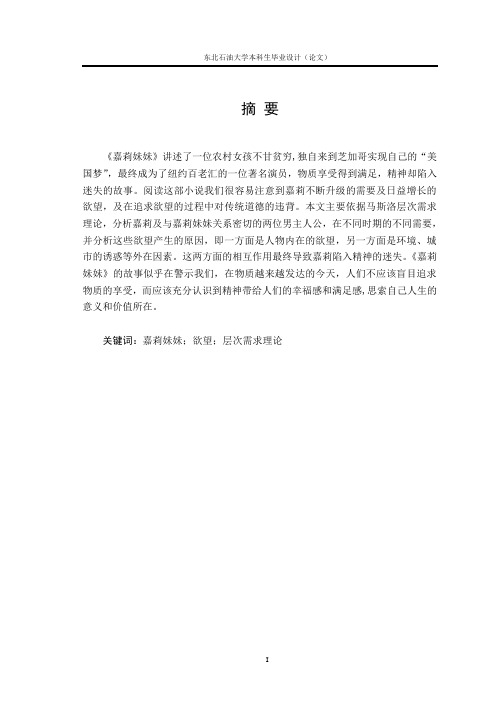
摘要《嘉莉妹妹》讲述了一位农村女孩不甘贫穷,独自来到芝加哥实现自己的“美国梦”,最终成为了纽约百老汇的一位著名演员,物质享受得到满足,精神却陷入迷失的故事。
阅读这部小说我们很容易注意到嘉莉不断升级的需要及日益增长的欲望,及在追求欲望的过程中对传统道德的违背。
本文主要依据马斯洛层次需求理论,分析嘉莉及与嘉莉妹妹关系密切的两位男主人公,在不同时期的不同需要,并分析这些欲望产生的原因,即一方面是人物内在的欲望,另一方面是环境、城市的诱惑等外在因素。
这两方面的相互作用最终导致嘉莉陷入精神的迷失。
《嘉莉妹妹》的故事似乎在警示我们,在物质越来越发达的今天,人们不应该盲目追求物质的享受,而应该充分认识到精神带给人们的幸福感和满足感,思索自己人生的意义和价值所在。
关键词:嘉莉妹妹;欲望;层次需求理论AbstractSister Carrie tells the story of a small country girl Carrie who moves to Chicago to realize her “American Dream” and eventually becomes a Broadway star in New York. Despite living a luxurious life, she is lost in spirit. Reading the novel, we may easily notice Carrie’s different needs and desires arising gradually and also the betrayal of traditional moral code in the process of pursuing material gain. The paper analyzes the reasons why Carrie and two male heroes closed to her have various needs at different stages of life, mainly based on Maslow’s hierarchy of needs. One is figures’inner desires; the other is the outside force, including temptations of environment, cites, etc. The interaction between them makes Carrie lose herself eventually. It seems to tell people that in modern society material supplies more and more abundantly, but we should never pursue it blindly and much importance should be attached to happiness and stability created by spirit. It is essential to ponder the significance and the value of life.Key words: Sister Carrie; desire; hierarchy of needsContentsChapter 1 General Introduction (1)1.1 About the author and the novel (1)1.1.1 The author: Theodore Dreiser (1)1.1.2 The novel: Sister Carrie (1)1.2 About Maslow’s hierarchy of human needs (2)Chapter 2 Carrier’s needs (4)2.1 Carrie’s primary needs (4)2.1.1 The physiological needs: leaving for Chicago (4)2.1.2 The safety needs: becoming Drouet’s mistress (5)2.2 Carrie’s higher level needs (6)2.2.1 The love and belonging needs — awaking step (6)2.2.2 The esteem needs — advanced development (7)2.2.3 The self-actualization needs — ultimate goal (8)Chapter 3 Drouet’s needs (10)3.1 Drouet’s primary needs (10)3.1.1 The physiological needs: the pursuit of Carrie (10)3.1.2 The safety needs: the satisfaction of material (11)3.2 Droue t’s higher level needs (12)Chapter 4 Hurstwood’s needs (13)4.1 Hurstwood’s needs in Chicago (13)4.1.1 Hurstwood’s physiological needs (13)4.1.2 Hurstwood’s safety needs (14)4.1.3 Hurstwood’s love and belonging needs (14)4.2 Hurstwood’s needs in New York (15)Conclusion (17)References (19)Acknowledgments (20)Chapter 1 General Introduction1.1 About the author and the novel1.1.1 The author: Theodore DreiserTheodore Dreiser is the most outstanding realistic novelist in the history of American literature. He is also an American naturalistic writer famous for the exploration of realistic life. Dreiser was born in Indiana in a poor German immigrant family. When Dreiser was eight, his mother was forced by the pressure of living, left home with him and three other young children, wandered from one town to another in the Midwest. The family lived a tough and criticized life. Dreiser’s childhood also endured poverty and ignorance.In 1887, he came to Chicago alone, worked in restaurants and hardware companies. In spite of this, he was attracted by the city life full of excitement and stimulation. In 1889, “he was sponsored by a sympathetic middle school teacher to study at the University of Indiana. But he dropped out of school the next year, returned to Chicago to become a debt collector in a real estate and furniture company” (Wang Sixiang, 2009: 158). This job led him to come into contact with the underworld characters and the dark side of society, accumulated a wealth of material for the future creation. It also determined the naturalistic color and the tragic thought of his creation. Dreiser entered the press in 1892, started to be a journalist. In Chicago, he witnessed the strong contrast of extreme poverty and extravagant life. These experiences are the beginning of his thought, which led him to create his own novel.1.1.2 The novel: Sister CarrieSister Carrie, Theodore Dreiser’s first novel, is a good work of epoch-making significance in the history of American fiction. This novel tells the story of Caroline Meeber, a pretty rural girl, leaves her rural home to make a living in Chicago. On the train, she meets Charles Drouet, a traveling salesman. The harsh reality shatters her dream. At the same time, in front of her is unemployment and disease. In desperation she becomes Drouet’s mistress. Later, due to the greater desire, she becomes the hotelmanager Hurstwood’s mistress. Hurstwood and Carrie elope to New York, and Carrie becomes a popular actor by chance and squeezes into the upper class. However, Hurstwood becomes poorer and finally committed suicide. The life of upper class does not make her feel satisfied. She feels empty and can not find the real meaning of life. In the loneliness and desolation, she sits in a rocking chair dreaming of the happiness that she would not get.The novel reveals the cruel squeezing of the American capitalist system for poor people and the corrosive action of bourgeois lifestyle for petty bourgeois. And the moral concept the novel reflects is also a counter-tradition. Because Carrie rather than be punished for her depravity, but becomes a popular star of musical comedies finally. Therefore, this book has aroused widespread concern in society since it was published, was banned for a time which led up to intense controversy of the literary world for more than 30 years until it is regarded as a classic to gain public recognition. Until today the novel was born one hundred years later, people are still controversial about Carrie’s character and behavior, especially her endless desire.1.2 About Maslow’s hierarchy of human needsIn Maslow’s hierarchy of needs, there are five kinds of needs ranging from lower level to higher level. These are physiological, safety, love, esteem, and self-actualization needs. (1)The physiological needs — it is the most basic requirement of human beings, including food, sleep, water, secretion, and sex. If any one of these needs, except sex, can not be satisfied, the physiological function of human can not operate normally. In other words, the life of human would be threatened. In this sense, the physiological need is the primary motivation of people’s action. Maslow believes that only those basic needs be met, the other needs can become new motivating factors. And to this point, the needs has been relatively satisfied will no longer be motivating factors. (2)The safety needs — it is the demand for the following things: personal and property safety, health care, job security and family safety. Maslow believes that the pursuit of the whole organism is a security mechanism, the human receptors, effectors’ organs, intelligence and other forms of energy are mainly seeking safety tools. We can even put both science and philosophy as part of meeting the security needs. (3)The love and belonging needs — if both physiological and safety needs are relatively well satisfied, and then there will emerge the love and belonging needs. Everyone wants to get mutual concern and care.The love and belonging needs is more meticulous than the physiological needs. It relates to a person’s physiological characteristics, experience, education and religion. Generally people will hunger for affectionate relations with others, for a place in the group and have a family. (4)The esteem needs — everyone wants to have a stable social status. And it requests that personal ability and achievements are recognized by the society. These needs can be divided into two parts. First is the desire for strength, achievement, adequacy, confidence and freedom. Secondly, we have what we may call the desire for reputation, attention, importance or appreciation. Satisfaction of the esteem need can make people have confidence, worth, strength, capability and adequacy of being useful and necessary in the world. (5)The self-actualization needs — it is the highest level of needs. It refers to the realization of personal ideals, aspirations and the individual’s ability to the greatest degree. Maslow notes that in order to satisfy self-actualization needs, different people take different measures. The self-actualization need is an effort to realize their potential. It is to make them become the characters they desire to be.These basic needs are related to each one and another, but any physiological and safety needs that remain unsatisfied will keep playing an important role, and needs at one level do not have to be completely satisfied before needs at the next higher level come into play. This means that the highest goal will monopolize consciousness and will tend to organize the recruitment of the various capacities of the organism. The lower needs are minimized, even forgotten or denied. But when a need is fairly well satisfied, the next higher need emerges,in turn to dominate the conscious life and to serve as the center of organization of behavior, since gratified needs are not active motivators.Chapter 2 Carrier’s needs2.1 Carrie’s primary needs2.1.1 The physiological needs: leaving for ChicagoBy the end of the Civil War (1861-1865), most of the forces that would typify twentieth century American had begun to emerge. Northern industrialism had triumphed over southern agrarianism. The great age of big city bossism began. Americans ceased to be isolated from the world and from each other. Soon the United States had the most extensive railroad system in the world. The tempo of life accelerated as Americans became increasingly mobile. From 1870 to 1890 the total population of the United States doubled. Villages became towns, towns became cities, and cities grew to a size with a speed that would have astonished the Founding Fathers. The population of Chicago increased twenty times to two million, making it the nation’s second largest city after New York. The national income quadrupled. It was the beginning of what Mark Twain called “The Gilded Age”. Thousands and thousands of men, women and children native-born and foreign, flooded to American cities, drawn by hopes for making their fortune. They believed that anyone could grasp an opportunity to attain success through honest and hard work. Just as American naturalists argued: the world was amoral, that men and women had no free will, that their lives were controlled by heredity and the environment.Dreiser clothed the social phenomenon of so-called “American Dream” through his character, Carrie. At the beginning of the novel, the heroin, Carrie, keeps pace with the general trend of the time, and moves to Chicago, which is not far away from her hometown. She is eighteen years old, bright, timid, and full of the illusions of ignorance and youth:And yet she was interested in her charms, quickly to understand the keenerpleasures of life, ambitious to gain in material things. A half-equipped littleknight she was, venturing to reconnoiter the mysterious city and dreamingwild dreams of some vague, far-off supremacy, which should make it preyand subject-the proper penitent, groveling at a woman’s slipper. (TheodoreDreiser, 1979: 3)In Maslow’s view, humans are wanting beings, mainly because humans are not satisfied with the status and are eager to achieve a higher realm. Desire is one of the strong emotions which tells people that he is still curious to exist, that he still have an edge on his longings and want to bite into the world. Carrie is driven by the environment and the internal desire to move to Chicago. Strictly speaking, it is the physiological needs. Carrie wants to change the poor life. She begins to hunt a job to earn money to fulfill her needs. Carrie accepts a job in a shoe factory for four and a half dollars a week. Every week she pays four dollars for her board and lodging. Does the story develop smoothly like this? The author gave a hint by writing “When a girl leaves her home at eighteen, she does one of two things. Either she falls into saving hands and becomes better, or she rapidly assumes the cosmopolitan standard of virtue and becomes worse” (Zhang Xiaowei, 2011: 203). Carrie tries to live on her own to start her first step of material pursuit.2.1.2 The safety needs: becoming Drouet’s mistressChicago is a charming city indeed. Carrie is surrounded by various temptations: Carrie passed along the busy aisles, much affected by the remarkabledisplays of trinkets, dress goods, stationary and jewelry. Each separatecounter was a show place of dazzling interest and attraction. She could nothelp feeling the claim of each trinket and valuable upon her personally.There was nothing there which she could not have to used-nothing whichshe did not along to own. The dainty slippers and stockings, the delicatelyfrilled skirts and petticoats, the laces, ribbons, hair-combs, purses, all touchher with individual desires. (Theodore Dreiser, 1979: 27)She longs for dress and beauty with a whole heart.But the fact is that the cold reality takes her by the hand. First, her sister and brother-in-law live a lean life and consumed by housework. The money left by Carrie every week is not enough for her car fares, let alone clothes, laces, ribbons, etc. And none of those things is in the range of her purchase. Second, in the shoe factory, the machines work intensively. Carrie is not strong. Her shoulders and necks ache in bending over and she is totally exhausted every day. “As Carrie listened to this and much more of similar familiar badinage among the men and the girls, she instinctively withdraws into herself. She feared that the young boys about would address such remarks to he r” (LI Wei, 2011: 278). The wholeatmosphere of the shoe factory is sordid.Carrie does not like to bear the hard work, the foul working condition and the human environment. She hopes to break away from the factory to enjoy physical comfort and from such uncouth men to keep her calm. Third, as the rigorous winter is around the corner, Carrie worries about the problem of winter clothes, for she has nothing to wear. At last, as a result of illness she loses the job and to return hometown seems to be the only choice.According to Maslow’s hierarchy of needs, if the physiological needs are relatively well gratified, there then emerge the safety needs. The problem is that whether she can satisfy it or not, it depends on the reality which supplies enough conditions or not, besides her own effort. Carrie understands that it is impossible to buy dress and entertain herself by her personal diligence. Drouet is, for Carrie, an escape. She does not love him, but he means a source of amazement, and she recognizes that the relative opulence of his chambers and department he procures for Carrie are the signs of that for which she is striving. Eventually she betrays herself to become Drouet’s mistress to realize her safety need. Carrie and Drouet pay a visit all round the city and go shopping, take part in various activities, enjoy delicious foods. It seems that Carrie has never hesitated,“Money! Money! What a thing it was to have! How plenty of it would clear away all the troubles” (Theodore Dreiser, 1979: 82). She surrendered to the magic of money. At the second stage of material pursuit, Carrie has a much stronger desire. She falls in love with it without reason.2.2 Carrie’s higher level needs2.2.1 The love and belonging needs — awaking stepAs the plot goes, the author depicts a panorama of rising needs and desire. On one hand, Carrie is not just satisfied with living together with Drouet:That young lady, under the stress of her situation and the tutelage of hernew friend, changed effectively. She the glow of a more showy life was notupon her. She did not grow in knowledge so much as she awakened in thematter of desire. Mrs. Hale’s extended harangues upon the subjects ofwealth and position taught her to distinguish between degrees of wealth.(Theodore Dreiser, 1979: 140)When she comes to her own room, Carrie sees her comparative poverty. She is not comparing it with what she has had, but what she has seen recently. She begins toponder what, after all, Drouet is and what she is. On the other hand, Carrie fears of losing Drouet’s affection, of being abandoned, and also she longs for someone to sympathize with her, but not let her ponder and wonder. It makes clear to Carrie that Drouet could not understand her. He just cares about her beauty. When Carrie is sorrow, he only asks her to dance. Carrie feels lonely and forsaken. What’s more, Carrie believes Drouet does not plan to marry her. He prefers the single state to any legal bondage. These two sides wake up Carrie’s deep desire. She “hopes to live an extravagant life but not from hand to mouth” (Peng Dankui, 1995: 74). She is eager to be understood and loved. Drouet is only an intermediary in her movement from poverty to affluence. Carrie is ready and longs to change.More wealth and higher status are Carrie’s new goal. At this time, Hurstwood becomes another male stepladder to gratify her needs both in material and spirit. Hurstwood can give her a life of honor. Carrie recognizes the quality of Hurstwood’s clothes, his style and his bearing as distinct improvements on Drouet. Hurstwood shows his thoughts and feelings concerning Carrie. “In contrast, Hurstwood appeared strong and sincere. He had no easy manner of putting her off. He sympathized with her and showed her what her true value was. He needed her, while Drouet did not care” (Gao Chenke, 2011: 115).Though Carrie has achieved her material goal, all in all, she has another need—love. Carrie begins to care about her inner thoughts, which takes the first step of exploring her spirit. Carrie’s spirit pursuit is based on material pursuit.2.2.2 The esteem needs — advanced developmentAfter becoming Hurstwood’s mistress, in a material way, Carrie is considerably improved. Hurstwood writes her regularly-a letter every morning. They both enjoy the happy days. Carrie has an opportunity to take part in a play. It is not an important thing, but because of the prestige of Hurstwood, it is significant. “By the time of the 16th had arrived Hurstwood’s friends had rallied like Romans to a senator’s call. A well-dressed, good-natured, flatteringly-inclined audience was assured from the moment he thought of assisting Carrie”(Theodore Dreiser, 1979: 209). Carrie moves into a new environment. She feels the respect and power of celebrities. Carrie’s needs develop further: the esteem needs. That is the desire for confidence and appreciation:There was nothing bold in her manner. Life had not taught herdomination-superciliousness of grace, which is the lordly power of somewomen. Her longing for consideration was not sufficiently powerful tomove her to demand it. Even now she lacked self-assurance, but there wasthat in what she had already experienced which left her a little less thantimid. She wanted pleasure, she wanted position. (Theodore Dreiser, 1979:176)For Carrie she is nervous. She hopes the play could succeed to gain confidence and appreciation, “The glamour, the tense situation, the fine clothes, the applause, these had lured her until she felt that she, too, could act-that she, too, could compel acknowledgment of power” (Theodore Dreiser, 1979: 192). Carrie tries best to explore her potentials.2.2.3 The self-actualization needs — ultimate goalHurstwood coaxes Carrie to elope to New York. But he is merely another man who either cannot hold or find a job. He forces to begin the battle for place and comfort all over again. But his situation becomes worse and worse. At the beginning, he strolls about, and then he just picks his papers up, and stays for day after day. At last, he becomes a beggar completely, lived by other’s charity. Finally he committed suicide by turning on the gas in a Bowery flophouse. When the attraction of material disappears, it is inevitable for Carrie to abandon Hurstwood. The physiological and safety needs play an important role now. Carrie begins to make a livelihood on her own. Different from the former experience, this time, she is successful by her own power without depending on some other men. Carrie becomes an actor because of her pretty-look and her diligence. Her salary rises from 30 dollars to 150 dollars per week. She becomes a famous star. She could possess of her gowns and carriage, her furniture and bank account. But she is alone, “It does not take money long to make plain its important, providing the desires are in the realm of affection. With one hundred and fifty in hand, Carrie could think of nothing particularly to do. In itself, as a tangible, apparent thing which she could touch and look upon, but this soon passed” (Theodore Dreiser, 1979: 548).After Carrie gains her economic status, there is only self-actualization need left. And Ames helps Carrie sublimate her spiritual pursuit into the world of literature and philosophy. Ames isn’t attracted by Carrie’s beauty, but there is something in him that has attracted her. Ames says to Carrie that riches are not everything, and there is always a great deal more in the world than she has known. Carrie understands that the thingsAmes pointed out is not money, or clothes, or applauses but a kind heart to serve others. It is an aesthetic world of which Carrie has not dreamed of and which she recognizes as a new peak to conquer and a new level to achieve. Carrie moves to the highest needs, which states that the true value of life is not in what we get but in what we give. This is the ultimate goal in her spiritual world.Chapter 3 Drouet’s needs3.1 Drouet’s primary needs3.1.1 The physiological needs: the pursuit of CarrieDrouet is a man who has a keen desire for the feminine. In the driving of the sexual instinct, he will involuntarily chase every beautiful woman he meets. After seeing beautiful pure Carrie on the train, he is attracted by her. With beautiful clothes, grandiose talk and his experiences of chatting up girls, Drouet wins Carrie’s favor. Just as the author says:Let him meet with a young woman once and he would approach her withan air of kindly familiarity, not unmixed with pleading, which would resultin most cases in a tolerant acceptance. If she showed any tendency tocoquetry he would be apt to straighten her tie, or if she “took up” with himat all, to call her by her first name. If he visited a department store it was tolounge familiarly over the counter and ask some leading questions. In moreexclusive circles, on the train or in waiting stations, he went slower. If someseemingly vulnerable object appeared he was all attention to pass thecompliments of the day to lead the way to the parlor car, carrying her grip,or, failing that, to take a seat next her with the hope of being able to courther to her destination. Pillows, books, a footstool, the shade lowered; allthese figured in the things which he could do. If, when she reached herdestination he did not alight and attend her baggage for her, it was because,in his own estimation, he had signally failed. (Theodore Dreiser, 1979:5) Drouet’s chasing for young beautiful girls is not because he is a cold-blooded, black heart, scheming villain, but because he is full of lust. When Drouet meet Carrie in the street secondly, Carrie was looking for a job and has no winter clothes to wear. Then he use Carrie’s plight to persuade her to leave her sister’s home and l ive together with him. After Carrie beca me Drouet’s mistress, Drouet didn’t have the plan to marry her. In the second part of the novel, Drouet and Carrie met again in New York, after he tried to mend fences and Carrie refused, he was not feeling so sad. Because, for him, he canfind a woman for pleasure wherever. Losing Carrie is not so important for him. At the end of the novel, on the night of a big snowstorm, he is talking with a partner to discuss where to look for a woman to have fun.3.1.2 The safety needs: the satisfaction of materialThe great industrial development in American brings about the booming of the cities like Chicago and New York. At the same time, the social gap between the rich and the poor is widening. People are obviously graded. Whether having high material consumption ability has almost become the sole criterion of level division. Drouet is divided into middle class in this social background. He doesn’t have to live in poverty like Hanson, but not as well as Hurstwood has a wealthy family and prominent position. He is good at enjoying life and the pursuit of a higher level of material comforts, immersed in his salesman career and tried to improve his social status. In his view, his life is fulfilling and almost perfect. He dressed in fashion style, wearing a striped plaid wool suit, white and pink striped shirt, gold-plated button, covered with yellow agate known as the “cat ey e”. His vest dangled a neat gold watch chain, matched with a pair of glowing shoes and a fedora. This fashionable dress greatly satisfied the vanity of him. Drouet’s s afety needs come to be realized in the abundant material world.Drouet likes to have dinner at Rector’s,a restaurant he believes that successful person would go. After dinner, he likes to go to th e resort of Fitzgerald and Moy’s to drink a glass of whiskey and enjoy a couple of cigars. In such a place, he can get to know a variety of celebrities, in order to increase the capital to show off and meet his vanity. The author has described it in detail:Rector’s, with its polished marble walls and floor, its profusion of lights, itsshow of china and silverware, and, above all, its reputation as a resort foractors and professional men, seemed to him the proper place for asuccessful man to go. He loved fine clothes, good eating, and particularlythe company and acquaintanceship of successful men. When dining, it wassource of keen satisfaction to him to know that Joseph Jefferson was wontto come to this same place, that Henry E. Dixie, a well known performer ofthe day, was then only a few tables off. (Theodore Dreiser, 1979: 39) As a successful salesman, Drouet believes that it is an honor to be able to make celebrities. At the same time, the big company he is working for also let him feel glory. With the reputation of Bartlett, Caryoe & Company, his work goes well. Although he isnot rich, also does not have a high social status, but he is good at communication, appropriate interaction with others, which also provides a possibility of success in his career. Living with Carrie, Drouet’s career developed gradually and his social status improved accordingly. When he and Carrie meet again, he has been responsible for a branch and is about to establish his own company. He can meet Carrie’s desire for material. He bought her beautiful dresses and coats, purchased cosmetics and went to the theatre with her. But objectively speaking, he was too concerned with material life, treat feelings do not serious. This is also the most dissatisfied for Carrie.3.2 Drouet’s higher level needsAlthough the physiological and material satisfaction is very important for Drouet, he has some higher level of needs. As a traveling salesman, Drouet’s social status is not high. He frequently went to the restaurants and pubs which celebrities always went to. In addition to the pursuit of material comforts, but also he is in the search for a social identity and the sense of belonging. Eating and talking together with the upper-class people, let him have a feeling of integrated into the society.His pursuit of Carrie is not only to satisfy his needs for sex, but also to get rid of the emptiness.Due to his work requirement, Drouet often go to travel around, and he is lacking of group sense of belonging. While Carrie as his mistress, can bring him some emotional comfort.In addition, Carrie’s young and beautiful can meet Drouet’s vanity. And he can show off in social occasions. However, Carrie is not the only choice for Drouet. Instead of creating a stable family, the best way to meet his spiritual emptiness is to seek new love affairs constantly. That is also the reason why he does not marry Carrie.。
论嘉莉妹妹悲剧命运的决定性影响因素
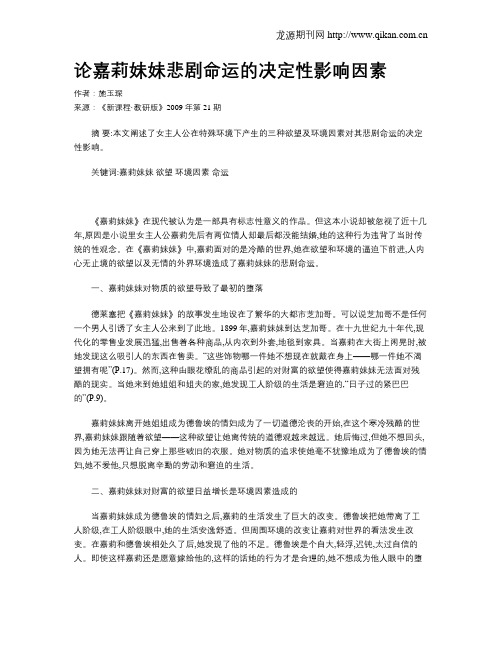
论嘉莉妹妹悲剧命运的决定性影响因素作者:施玉琛来源:《新课程·教研版》2009年第21期摘要:本文阐述了女主人公在特殊环境下产生的三种欲望及环境因素对其悲剧命运的决定性影响。
关键词:嘉莉妹妹欲望环境因素命运《嘉莉妹妹》在现代被认为是一部具有标志性意义的作品。
但这本小说却被忽视了近十几年,原因是小说里女主人公嘉莉先后有两位情人却最后都没能结婚,她的这种行为违背了当时传统的性观念。
在《嘉莉妹妹》中,嘉莉面对的是冷酷的世界,她在欲望和环境的逼迫下前进,人内心无止境的欲望以及无情的外界环境造成了嘉莉妹妹的悲剧命运。
一、嘉莉妹妹对物质的欲望导致了最初的堕落德莱塞把《嘉莉妹妹》的故事发生地设在了繁华的大都市芝加哥。
可以说芝加哥不是任何一个男人引诱了女主人公来到了此地。
1899年,嘉莉妹妹到达芝加哥。
在十九世纪九十年代,现代化的零售业发展迅猛,出售着各种商品,从内衣到外套,地毯到家具。
当嘉莉在大街上闲晃时,被她发现这么吸引人的东西在售卖。
“这些饰物哪一件她不想现在就戴在身上——哪一件她不渴望拥有呢”(P.17)。
然而,这种由眼花缭乱的商品引起的对财富的欲望使得嘉莉妹妹无法面对残酷的现实。
当她来到她姐姐和姐夫的家,她发现工人阶级的生活是窘迫的,“日子过的紧巴巴的”(P.9)。
嘉莉妹妹离开她姐姐成为德鲁埃的情妇成为了一切道德沦丧的开始,在这个寒冷残酷的世界,嘉莉妹妹跟随着欲望——这种欲望让她离传统的道德观越来越远。
她后悔过,但她不想回头,因为她无法再让自己穿上那些破旧的衣服。
她对物质的追求使她毫不犹豫地成为了德鲁埃的情妇,她不爱他,只想脱离辛勤的劳动和窘迫的生活。
二、嘉莉妹妹对财富的欲望日益增长是环境因素造成的当嘉莉妹妹成为德鲁埃的情妇之后,嘉莉的生活发生了巨大的改变。
德鲁埃把她带离了工人阶级,在工人阶级眼中,她的生活安逸舒适。
但周围环境的改变让嘉莉对世界的看法发生改变。
在嘉莉和德鲁埃相处久了后,她发现了他的不足。
解读《嘉莉妹妹》中主人公的人生
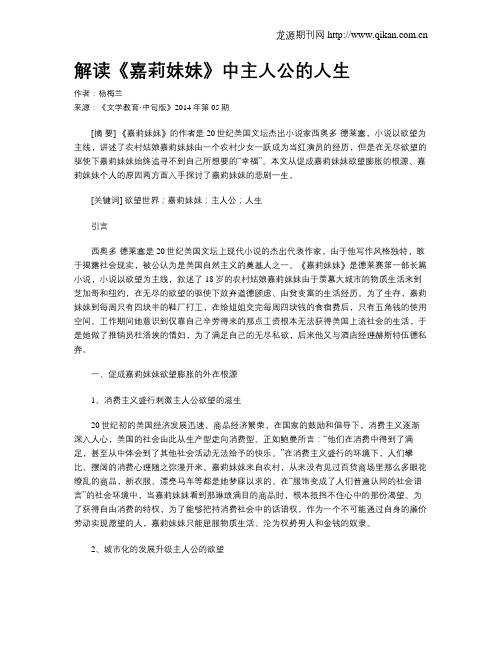
解读《嘉莉妹妹》中主人公的人生作者:杨梅兰来源:《文学教育·中旬版》2014年第05期[摘要] 《嘉莉妹妹》的作者是20世纪美国文坛杰出小说家西奥多·德莱塞,小说以欲望为主线,讲述了农村姑娘嘉莉妹妹由一个农村少女一跃成为当红演员的经历,但是在无尽欲望的驱使下嘉莉妹妹始终追寻不到自己所想要的“幸福”。
本文从促成嘉莉妹妹欲望膨胀的根源、嘉莉妹妹个人的原因两方面入手探讨了嘉莉妹妹的悲剧一生。
[关键词] 欲望世界;嘉莉妹妹;主人公;人生引言西奥多·德莱塞是20世纪美国文坛上现代小说的杰出代表作家,由于他写作风格独特,敢于揭露社会现实,被公认为是美国自然主义的奠基人之一。
《嘉莉妹妹》是德莱赛第一部长篇小说,小说以欲望为主线,叙述了18岁的农村姑娘嘉莉妹妹由于羡慕大城市的物质生活来到芝加哥和纽约,在无尽的欲望的驱使下放弃道德顾虑、由贫变富的生活经历。
为了生存,嘉莉妹妹到每周只有四块半的鞋厂打工,在给姐姐交完每周四块钱的食宿费后,只有五角钱的使用空间。
工作期间她意识到仅靠自己辛劳得来的那点工资根本无法获得美国上流社会的生活,于是她做了推销员杜洛埃的情妇,为了满足自己的无尽私欲,后来他又与酒店经理赫斯特伍德私奔。
一、促成嘉莉妹妹欲望膨胀的外在根源1、消费主义盛行刺激主人公欲望的滋生20世纪初的美国经济发展迅速、商品经济繁荣,在国家的鼓励和倡导下,消费主义逐渐深入人心,美国的社会由此从生产型走向消费型。
正如鲍曼所言:“他们在消费中得到了满足,甚至从中体会到了其他社会活动无法给予的快乐。
”在消费主义盛行的环境下,人们攀比、摆阔的消费心理随之弥漫开来。
嘉莉妹妹来自农村,从来没有见过百货商场里那么多眼花缭乱的商品,新衣服、漂亮马车等都是她梦寐以求的。
在“服饰变成了人们普遍认同的社会语言”的社会环境中,当嘉莉妹妹看到那琳琅满目的商品时,根本抵挡不住心中的那份渴望。
为了获得自由消费的特权,为了能够把持消费社会中的话语权,作为一个不可能通过自身的廉价劳动实现愿望的人,嘉莉妹妹只能屈服物质生活、沦为权势男人和金钱的奴隶。
浅析影响嘉莉妹妹命运的主要因素
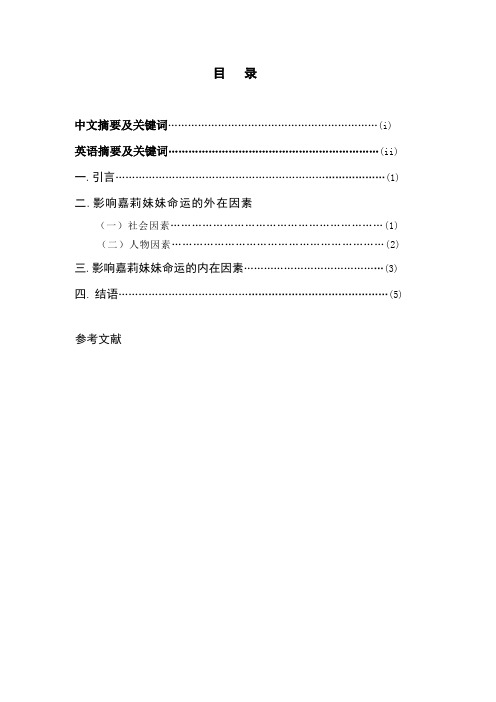
目录中文摘要及关键词 (i)英语摘要及关键词 (ii)一.引言 (1)二.影响嘉莉妹妹命运的外在因素(一)社会因素 (1)(二)人物因素 (2)三.影响嘉莉妹妹命运的内在因素 (3)四. 结语 (5)参考文献浅析影响嘉莉妹妹命运的主要因素王瑞营外国语学院英语教育河南新乡 453003摘要:自《嘉莉妹妹》问世起,有不少学者对影响嘉莉妹妹命运的因素进行了分析。
本篇文章分别从外在因素、内在因素进行了分析,外在因素着重从社会因素、人物因素进行了分析,而内在因素则从嘉莉妹妹自身的物欲进行了分析。
文章结尾指导人们正确控制物欲,切莫重蹈嘉莉妹妹的旧路。
关键词:命运内在因素外在因素欲望(i)Analysis of Main Factors Affecting Sister Carrie’s Fate WangRuiying EnglishEducationFacultyofForeignLanguages XinxiangHenan453003 Abstract: Since Sister Carrie was published, a lot of scholars analyzed the factors that had an effect on Carrie’s fate. This article analyzes the factors from two aspects which includes external and internal factors. External factors include social factor, people factor, while internal factor mainly analyzes Carrie’s material desire. At the end of this article, it askes people to control their material desire and avoid choosing the same road.Key words: fate external factor internal factor material desire(ii)一. 引言二十世纪初,德莱塞发表了他的第一部处女作《嘉莉妹妹》。
欲望_环境_影响嘉莉妹妹命运的主要因素

一、引言西奥多·德莱塞是美国20世纪著名自然主义作家。
父亲是笃信天主教的德国移民。
德莱塞家境贫寒,兄弟姐妹众多,中学未毕业便步入社会自谋生计。
后来,德莱塞在一位中学教师的资助下到印第安纳大学专修文学。
在大学求学期间,他阅读了达尔文、赫胥黎等人的著作,受到他们进步思想的影响。
在大学只学习了一年他便辍学前往芝加哥寻求发展。
为了生存,德莱塞干过洗碗工、检票员、洗衣房工人和家具店伙计等各种杂活。
1982年起,德莱塞先后在芝加哥和圣路易斯等地的报社任记者,写有关于时事及社会新闻等方面的文章。
1899年德莱塞开始创作第一部长篇小说《嘉莉妹妹》(Sister Carrie,1900),但由于小说揭露了美国社会贫富分化以及道德沦丧等丑恶现象,被认为“有伤风化”,所以一开始遭到禁止出版的厄运。
①而小说真实地展现当时的美国社会,正是自然主义作家德莱塞所推崇的,他强调欲望本能和环境是影响人物命运的主要因素。
主人公嘉莉便是最好的典范。
《嘉莉妹妹》展现的基本上是一个非道德的世界。
女主人公嘉莉为了生活而失身于杜鲁埃,后又与有妇之夫的赫斯特伍德“结婚”。
这在传统道德卫道士的眼光里是“不道德”的,理应受到惩罚。
而德莱塞笔下的嘉莉却平步青云,成为众人青睐的名演员,实现了她当初的财富梦想,命运得以改变。
她没有在痛苦中悲惨地死去,逃避了应有的惩罚。
这一事实说明小说的作者对那种认为“女人的贞操是她最宝贵的东西”而“罪过的行为应该用死来惩罚报应”的道德观根本不予理睬。
②19世纪末20世纪初,生产技术日益高超,机械化程度越来越高,贫富差距越来越大。
德莱塞在当记者的日子里,每天都能看到镀金时代美国城市工业社会里的贫富不均。
他发现“自私的物质主义”而不是“基督教的兄弟友爱”才是城市运做的原则。
③这是德莱塞接受自然主义的现实基础。
而接受达尔文的进化论思想与他那倍受环境摧残的家庭背景和他频频遭遇敌意、漠然、变化无常的命运、个人的微不足道是分不开的。
对嘉莉妹妹欲望的心理解析

对嘉莉妹妹欲望的心理解析◎魏京京(郑州大学外语学院河南・郑州450001)摘要小说《嘉莉妹妹》描述了一位女孩从农村到城市谋生直至后来成为纽约百老汇著名演员的故事。
文章运用弗洛伊德人格结构理论和马斯洛需求层次理论,对女主人公嘉莉妹妹的心理进行解析,从纵横两方面阐释其欲望背后的驱动力。
关键词欲望本我自我超我需求一、引言西奥多・德莱塞(Theodore Dreiser,1871-1945)是20世纪美国文坛上一位杰出的作家,也是美国现代小说创作的先驱。
他的第一部长篇小说《嘉莉妹妹》主要以欲望为主线,描述了女主人公嘉莉妹妹从一位农村姑娘变成纽约百老汇著名演员的整个过程,并对其生命沉浮中的种种心理变化进行了细致刻画。
小说不仅揭露了美国社会的贫富悬殊和道德沦丧,而且反映的道德观念也一反传统,因为嘉莉妹妹最终非但没有为其堕落行为受到惩罚,反而却红极一时。
因此,在1900年11月一经问世便激起轩然大波,曾一度被列为禁书,也从而引发了文学界长达三十余年的激烈争议,直至最终获得公众认可被推崇为经典之作。
但是,小说诞生一百多年后的今天,人们对嘉莉妹妹的性格特点及行为方式,尤其是她的无止欲望,仍然颇有争议褒贬不一。
诚然,欲望是支配嘉莉不择手段向上流社会攀登的巨大动力源泉。
但是,为什么她的欲望永远得不到满足,是什么因素支配着她不惜代价实现欲望?在揭示这些问题的原因时,由于受小说大量自然主义描写的影响,评论者多从她所处的社会环境和自然环境来分析,认为是外部因素主宰着她,使她在当时的社会与自然背景下,要想获得自我愿望的满足,只能接受命运的安排。
然而,辩证法认为,内因是事物发展变化的根据,外因是事物发展的条件,只有通过内因起作用。
因此,本文试从嘉莉妹妹自身特点和心理因素着手,运用著名心理学家弗洛伊德的人格结构理论和马斯洛的需求层次理论,从心理学角度对她的行为方式进行解析,探寻其不惜堕落而满足欲望的内在原因,以期对她的欲望有更深刻全面的了解。
欲望和挣扎是人的全部本质 —《嘉莉妹妹》和《珍妮姑娘》比较研究
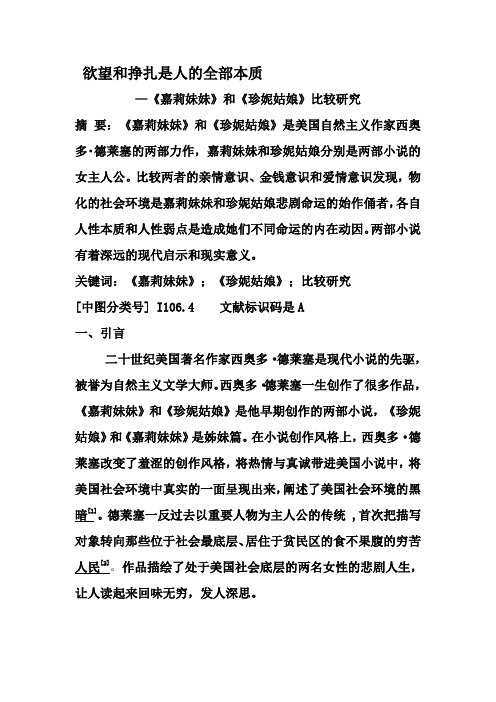
欲望和挣扎是人的全部本质—《嘉莉妹妹》和《珍妮姑娘》比较研究摘要:《嘉莉妹妹》和《珍妮姑娘》是美国自然主义作家西奥多‧德莱塞的两部力作,嘉莉妹妹和珍妮姑娘分别是两部小说的女主人公。
比较两者的亲情意识、金钱意识和爱情意识发现,物化的社会环境是嘉莉妹妹和珍妮姑娘悲剧命运的始作俑者,各自人性本质和人性弱点是造成她们不同命运的内在动因。
两部小说有着深远的现代启示和现实意义。
关键词:《嘉莉妹妹》;《珍妮姑娘》;比较研究[中图分类号] I106.4 文献标识码是A一、引言二十世纪美国著名作家西奥多·德莱塞是现代小说的先驱,被誉为自然主义文学大师。
西奥多·德莱塞一生创作了很多作品,《嘉莉妹妹》和《珍妮姑娘》是他早期创作的两部小说,《珍妮姑娘》和《嘉莉妹妹》是姊妹篇。
在小说创作风格上,西奥多·德莱塞改变了羞涩的创作风格,将热情与真诚带进美国小说中,将美国社会环境中真实的一面呈现出来,阐述了美国社会环境的黑暗[1]。
德莱塞一反过去以重要人物为主人公的传统 ,首次把描写对象转向那些位于社会最底层、居住于贫民区的食不果腹的穷苦人民[2]。
作品描绘了处于美国社会底层的两名女性的悲剧人生,让人读起来回味无穷,发人深思。
深受达尔文进化论思想和弗洛伊德心理分析学说的影响,德莱塞通过嘉莉妹妹和珍妮姑娘人本困境的叙述,体现了德莱塞的现实主义和悲剧哲学思想,聚焦了社会变革时期人性的异化,引导读者去思索社会,探究人性。
本文从亲情意识、金钱意识和爱情意识三个方面对嘉莉妹妹和珍妮姑娘两个人物进行比较分析,解读两部小说的现代启示和现实意义。
二、《嘉莉妹妹》和《珍妮姑娘》比较研究(一)《嘉莉妹妹》和《珍妮姑娘》之亲情意识比较《嘉莉妹妹》这部小说一问世就引起了强烈反响,小说中嘉莉的蜕变直接挑战了当时的男权思想和社会道德标准。
嘉莉妹妹毅然决然地离开生她养她的故乡和亲人,进入大都市的嘉莉妹妹充分运用了自身优势,利用男人对她的爱慕,解决了最基本的生存问题。
- 1、下载文档前请自行甄别文档内容的完整性,平台不提供额外的编辑、内容补充、找答案等附加服务。
- 2、"仅部分预览"的文档,不可在线预览部分如存在完整性等问题,可反馈申请退款(可完整预览的文档不适用该条件!)。
- 3、如文档侵犯您的权益,请联系客服反馈,我们会尽快为您处理(人工客服工作时间:9:00-18:30)。
在自然主义小说中, 小说家感兴趣的另一个话 题便是性本能。自然主义小说家从生理学的角度来 解释男与女之间的互相吸 引。因此, 在自然主义小说 中很少有缠绵悱恻的浪漫爱情故事, 男人和女人因 为各自的性本能的驱动而走到一起, 人物的命运也 经常是悲惨的。在《嘉莉 妹妹》中, 在嘉莉身上体现了 人对于物质的贪求, 在杜洛埃和赫斯特伍德身上则
德莱塞幼年饱尝家庭贫困之苦, 深刻体会到贫 穷对人造成的影响。青年时期的记者经历又使他对 社会和人性有了深入的理 解。在人性的问题上, 他强 调人的生物性。他的长篇小说探讨的一个重要问题 是本能与动 机之间的关系问题。诚如他自 己所言, 从
他 开 始 文 学 生 涯 之 日 起 , 便 痛 下 决 心 要 琢 磨 透“ 这 个 叫 人 的 动 物 ”, [2]并 要 忠 实 的 描 绘 他 。 德 莱 塞 认 为 人 的 天 性 本 能 , 或 叫 欲 求 、自 然 冲 动 , 是 驱 使 人 行 为 的 动因, 人的一举一动与自身的机体组织有密切的关 系。他认为, 人的本能的力量十分强大, 是人所无法 控制的。在《嘉莉妹妹》中, 德莱塞 主要探讨了人的物 欲及性本能对人的命运的决定性影响。
二、嘉莉妹妹对物质享受的无尽 的追求
《嘉 莉 妹 妹》讲 述 了 乡 下 姑 娘 嘉 莉 为 了 改 变 自 己 的命运来到芝加 哥追求自己希望的幸福生活 。可是, 芝加哥的冷酷的现实使她的希望破了产。生存的压 力与对物质 的追求使她先后委身于两个 男人。后来, 她一步步地取得了自己渴望的物质成功, 成了纽约 百老汇的当红喜剧明星, 而她曾经的情人赫斯特伍 德则从显赫的酒吧经理的位置上跌落下来, 成了街 上的乞丐, 最后悲惨地死去。阅读这部小说, 我们很 容易注意到嘉莉在走向物质上的成功的过程中, 她 的不断升级的欲望起了重要的作用。
小说多次提到女主人公嘉莉在两难选择时良心 与欲望的对话, 然而, 她的物欲经常压倒理智与良 心。应该承认, 人是有欲望的动物, 对物质的追求是 人得以 前进的动力。一旦人变得无欲无 求, 人就会失 去前进的动力, 就会失去生存的意义。然而, 欲望又 是一把双刃剑, 过于强烈的物欲会把人引向歧途, 使 人看不到有比物质更值得追求的东西。在欲望与理 智的斗争中, 嘉莉妹妹的欲望一次次地取得了胜利; 然而, 当她最终取得物质上的成功后, 她发现自己还 是 依 然 走 不 进 那 个“美 丽 的 有 围 墙 的 世 界 ”。 幸 福 对 她来说就像天上的彩虹那样虚无缥缈, 那样遥远, 可 望而不可即。在小说里, 德 莱塞将这种无穷尽的欲求 和 痛 苦 归 结 为“人 心 盲 目 的 挣 扎 ”, 在 他 的 眼 里 , 人 就 是 这 样 一 种“ 永 无 止 境 ”的“ 叫 做 人 的 动 物 ”, 基 本 上 仍 为 其“ 动 物 性 ”所 左 右 , [5]并 认 为 嘉 莉 妹 妹 永 远 也 得 不到自己梦想的幸福, 体现了作者对人性中的弱点 的洞察。细作观察, 嘉 莉在小说里一直都没有找到幸 福。她总是坐在摇椅上不停地摇着, 幻想着, 感到孤 独而惶惑。
语文学刊
体现了性本能对人的影响。 杜洛埃是个旅行推销员, 年轻, 精力充沛, 周身
洋溢着对女性的热切渴望。作者是这样描写他的: 他只要和一个年轻姑娘见过一次面, 就会极其
热情地靠上去, 巧言悦色, 常常使对方不好意思拒 绝。若是女方露出一丝调情的 意思, 他会直接替他拉 正 领 带 , 或 是 女 方 和 他“交 上 了 朋 友 ”, 他 便 会 直 呼 她 的名字。若是在 一家百货商店闲逛, 他就像很 熟似的 在柜台前懒洋洋站着, 说一些搭 讪的话。在一些不太 杂乱的地方, 如火车上或候车室里, 他会收敛一些。 倘若出现看样子容易得手的对象, 他便打足精 神— ——寒 暄 问 好 , 为 她 领 路 上 豪 华 的 客 车 , 替 她 拎 包。倘使拿不到包, 就在她身边坐下, 期望能护送她 到达目的地: 拿枕头啦, 送书啦, 摆脚凳啦, 放遮帘 啦。他能 做的主要就是这些。如果她到 了目的地, 他 却没有下车帮她照看行李, 那是因为照他估计他的 追 求 显 然 失 败 了 。[6]
[ 作者简介] 李世奎( 1974- ) , 男, 郑州大学 2005 级研究生, 河南科技大学讲师, 研究方向为美国文学。
2008.3
153
语 文 学 刊
作家作品
2008.3
并 不 清 楚 如 何 努 力 、怎 样 改 变 自 己 的 现 状 , 只 是 怀 着 幻想, 一头撞 进这充满物欲与诱惑的城市 。城市流光 溢彩的夜生活, 商场里琳琅满目的商品, 漂亮的服 饰, 都极大地激起了嘉莉的欲望。然而, 嘉莉面临的 生存环境与自身欲望却构成了鲜明的反差。从姐姐 的生活及自己后来的短暂的打工经历, 她看到, 通过 艰苦的工作来获得时髦的衣饰和过上享乐的生活是 不可能的。在回乡下老家和与杜洛埃同居以留在芝 加 哥的两难之中, 她选择了后者 。但与杜洛埃一起的 丰衣足食并未让嘉莉感到满足, 繁华的生活对她无 时无刻地影 响着。通过邻居海尔太太, 她学 会了区分 财富的等级, 更深地意识到了更大的财富所带来的 奢侈与体面 。她觉得如果掌握许多财富, 可 以发号施 令, 可以忧愁雾消云散, 心病立刻全无。而杜洛埃却 不能提供给她这些东西, 所以, 杜洛埃在她心目中的 地位不知不觉中就下降 了。这个时候, 赫斯特伍德进 入了嘉莉妹妹的生活。在嘉莉妹 妹看来, 赫斯特伍德 在许多方面都比杜洛埃精明。因为首先赫斯特伍德 在衣着打扮上比杜洛埃好; 其次, 赫斯特伍德举止文 雅, 在女士面前彬彬有礼, 体贴周到。嘉莉妹妹认为 这 是上流社会的标志。相比之下, 杜 洛埃衣服虽然不 错, 但显得过于华丽、张扬, 举止也 显得轻浮。更重要 的是, 赫斯特伍德是芝加哥最豪华的酒吧里的经理, 属她梦寐以求的上流社会的一员。杜洛埃在她心中 的地位就没有那么高了, 只不过是个到处旅行的推 销员罢了。于是, 赫斯特伍德又成 了嘉莉妹妹羡慕的 对象和梦想的象征。在赫斯特伍德的感情表白和攻 势之下, 嘉莉妹妹倒向了赫斯特伍德的怀抱, 成了自 己欲望的俘虏。因为在 她看来, 接受赫斯特伍德求爱 可以使自己进入以赫斯特伍德为代表的上流社会, 成为其中的一员。在赫斯特伍德盗窃了酒吧的公款 后, 嘉莉被骗和赫斯特伍德一起来到纽约。在这里, 通 过万斯太太, 她见识了纽约的奢 华。百老汇大街上 的富丽堂皇的景象, 男男女女身穿时髦的时装, 出入 各种高级消 费场所, 享受着奢华的生活。这 一切都撩 拨和刺激着嘉莉的欲望, 她多么渴望自己像他们一 样能够享受 生活啊。可是, 赫斯特伍德的经 济状况已 经今非昔比了。从昔日的酒吧经理的位置上跌落下 来, 赫斯特伍德在纽约用所剩不多的钱与人合伙开 了一家二流酒店维持生活。他已经不能像在芝加哥 那样大方阔绰了。这引起了嘉莉 的不满, 赫斯特伍德 在她心目中的形象也悄然起了变化。后来赫斯特伍 德的生意江河日下, 最终倒闭, 不得不依靠嘉莉当演 员挣来的收入生活。而嘉莉则渴望用挣来的工资买
语文学刊
论欲望对《嘉莉妹妹》中人物命运的影响
○ 李世奎 1, 2
( 1.郑州大学外国语学院, 河南 郑州 450052; 2.河南科技大学, 河南 洛阳 471003)
【摘 要】《嘉莉妹妹》是美国自然主义文学大师德莱塞的第一部长篇小说, 美国文学史家誉为“美国自然主 义小说发展史上的里程碑”。德莱塞从自然主义文学理念及对人性的深刻观察和理解出发, 在小说中描述了遗 传因素, 人的生物属性即欲望对人的影响,《嘉莉妹妹》小说以此为主题,大胆而真实演绎了“灵”与“肉”的激烈冲 突, [1] 开辟了从生理层面描写人的新角度。本文从自然主义所强调的遗传因素出发, 分析了欲望对人物命运的影 响。
在横扫整个宇宙、操纵着一切的种种自然力量 之中, 一个没有受过教育的人, 不过是风中的一束小 草罢了。我们的文明仍处在中间阶段……人类变得 聪明多了, 很少理会自己的本能和欲望; 然而, 它们 的 力 量 太 弱 , 还 不 足 以 压 倒 本 能 和 欲 望 。[3]
在 嘉 莉 妹 妹 身 上— ——就 跟 我 们 世 俗 之 辈 一 样 , 可 不 是 么 ? — ——本 能 与 理 性 、欲 念 与 理 智 , 始 终 在 争 夺 主 导 权 。她 的 欲 念 往 哪 里 走 , 她 就 跟 着 往 哪 里 走 。[4]
在性本能的驱动下, 杜洛埃就想扑火的飞蛾一 样, 只要遇到漂亮的女性, 他就会不由自主地去追 逐。当火车上遇到嘉莉时, 他为嘉莉的美貌所吸引, 主动上去 攀谈。凭着漂亮的衣服、浮夸的谈 吐及以往 对付女人的经验, 他获得了嘉莉的好感, 使后者给他 留下了联系 地址。后来他利用嘉莉的困境 , 说服了后 者离开姐姐的家与他同居。有一次嘉莉不在家的时 候, 他发现家中的女佣长相不错, 试图与之调情。在 作品的后半部分, 杜洛埃在纽约与嘉莉重逢, 他试图 和后者重修旧好遭到拒绝后, 他并不觉得难过, 因为 对他来说, 似乎在哪里都可以找到女人享乐, 失去嘉 莉并不是什么重大损 失。在小说的结尾处, 在一个风 雪交加的夜晚, 杜洛埃正和一个同伴商量去哪里找 女人玩耍。小说中的杜洛埃就像一块漂浮在水面上 的浮木, 被自己的欲望的洪流挟裹着, 漂浮不定, 没 有一个固定的人生目的。
154 自 己 渴 望 的 衣 服 以 及 享 受 生 活 , 这 样 赫 斯 特 伍 德 在 语 文 学 刊
她心目中就显得多余和讨厌了 。于是, 她离开了赫斯 特伍德, 靠着美貌以及一系列的好运气, 她最后成了 百老汇的喜剧明星。而赫斯特伍德则一步步地沦落 为街头乞丐, 最后悲惨地死去。
德莱塞在自然主义小说创作中, 倾注了他对人 性的理解。他认为, 在人类还处在进化的中间阶段, 人类虽有理性, 但理性的力量太弱, 还不足以控制人 的欲望 和本能。嘉莉妹妹的每一步行动 , 说到底是由 于她的欲望造成的:
女 主 人 公 嘉 莉 只 有 18 岁 , 聪 明 , 腼 腆 , 充 满 着 年 轻人无知的幻想, 为了获得更好的生存条件, 她放弃 了在家乡的许多便宜条件, 带着简单的行李来到了 芝加哥, 像一个武装未全的小骑士, 壮着胆子去闯那 神秘的都市生活, 梦幻着步步高升, 征服这个世界。 刚开始, 嘉莉来到芝加哥, 希望改变自己的命运, 享 受大城市里的 快乐: 漂亮的衣服, 各种娱乐。然 而, 她
